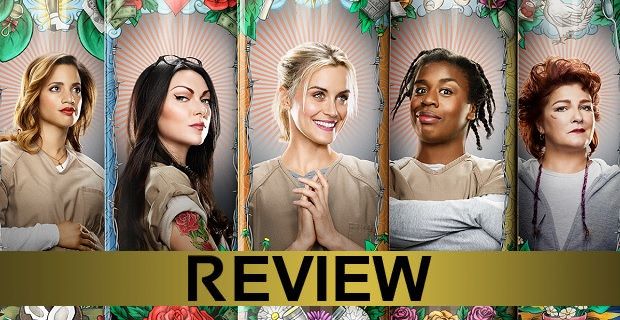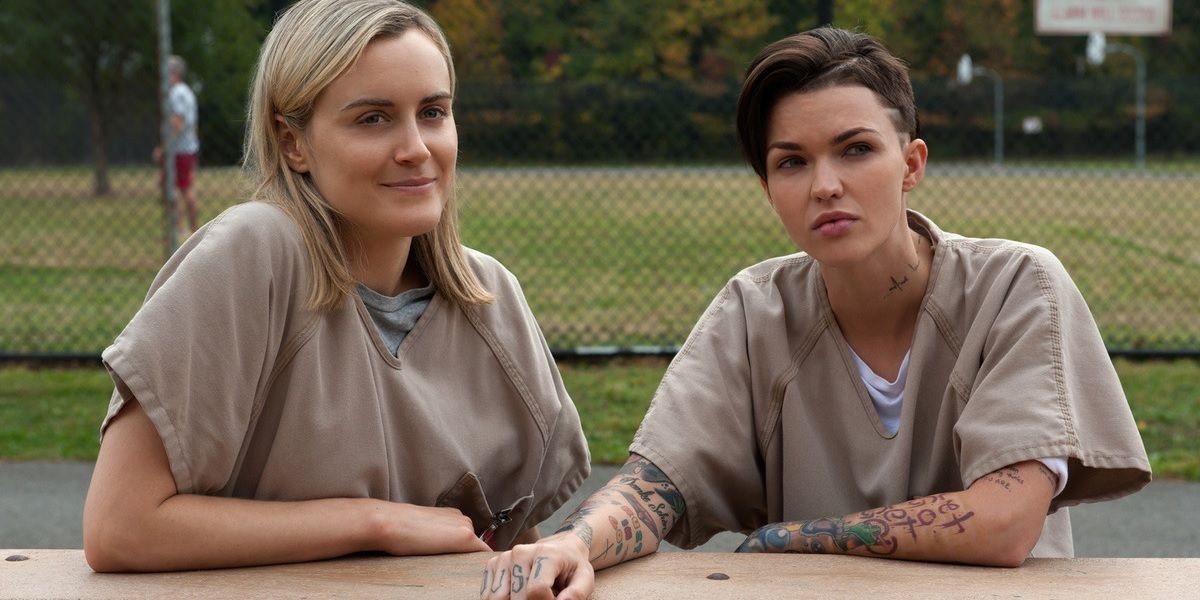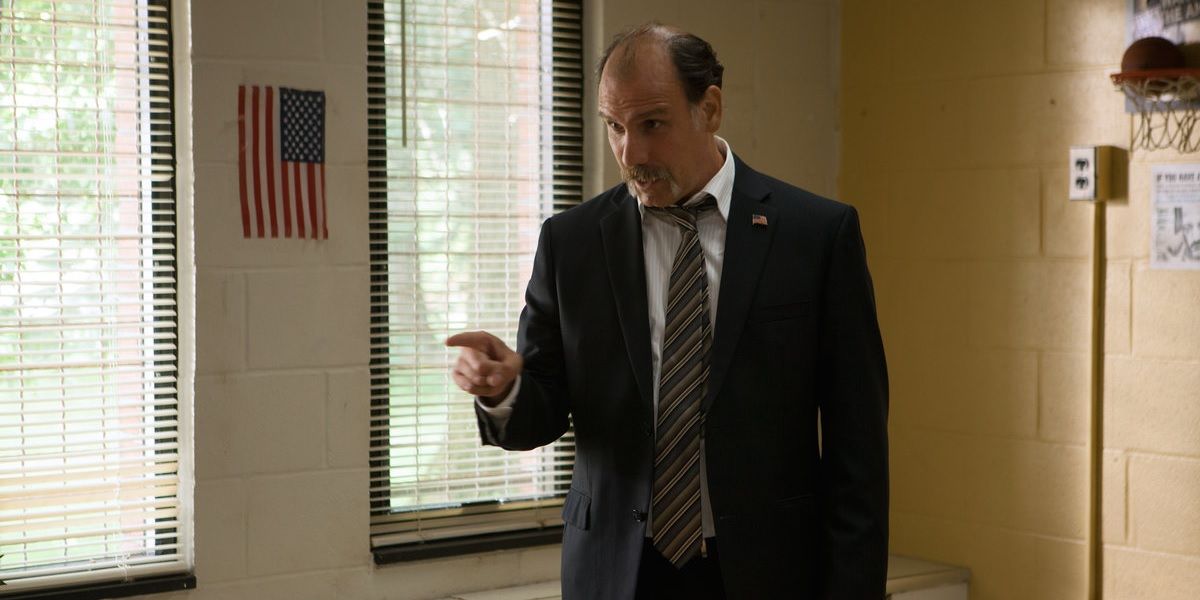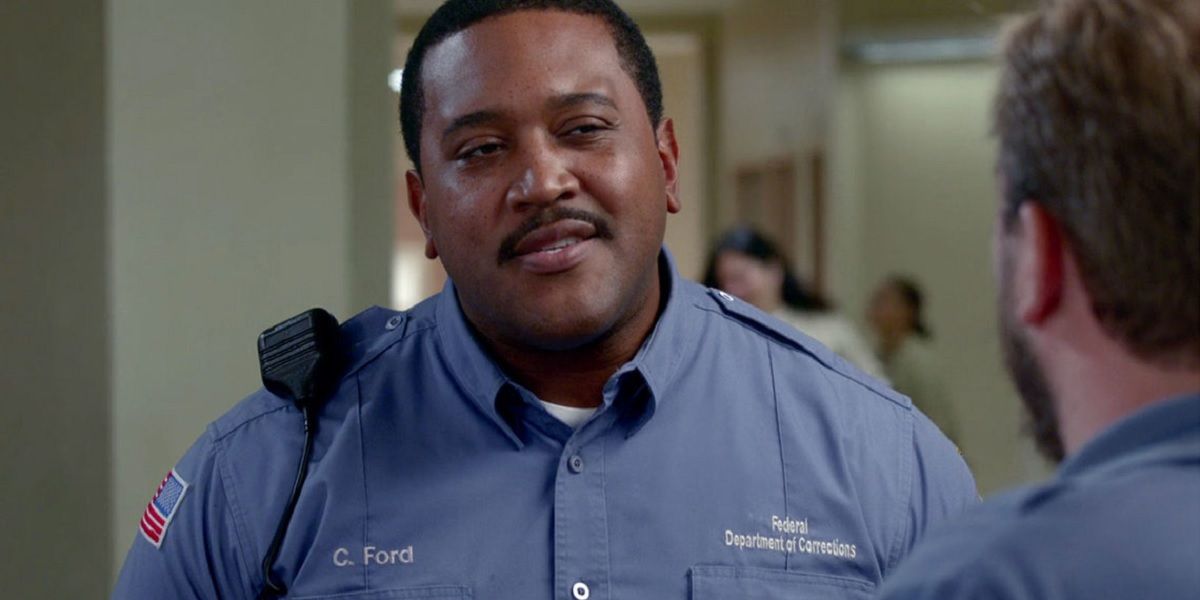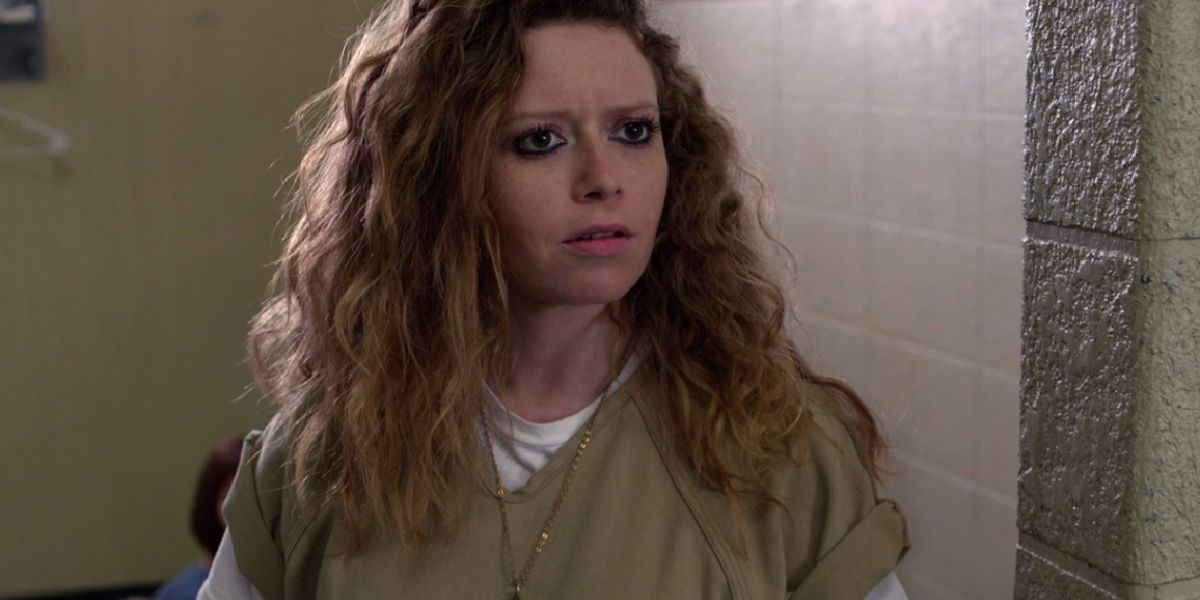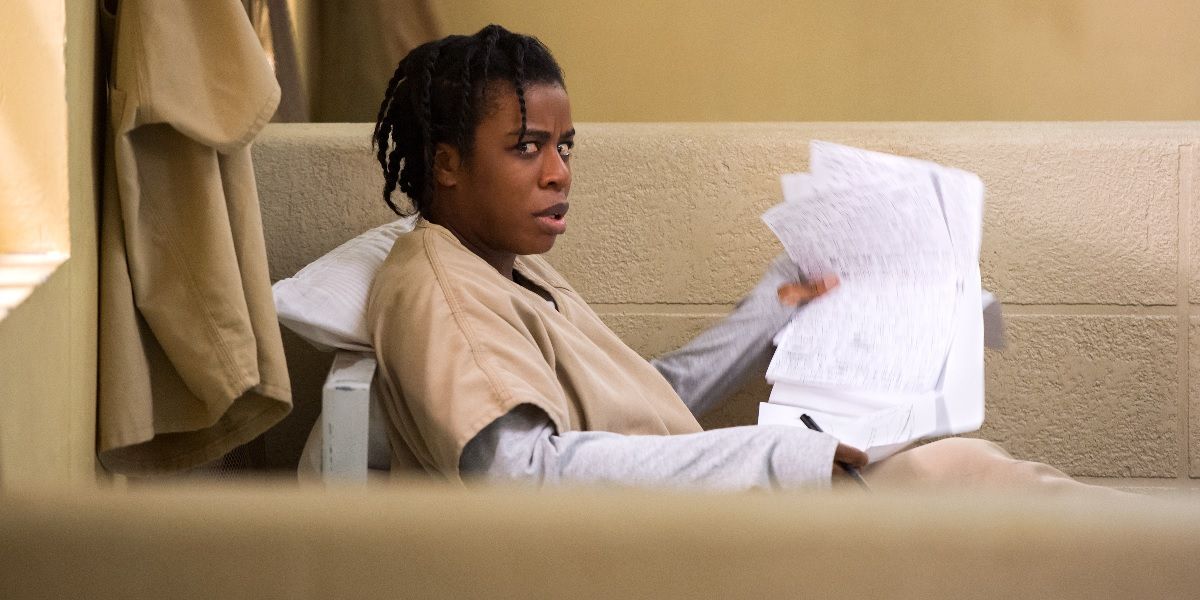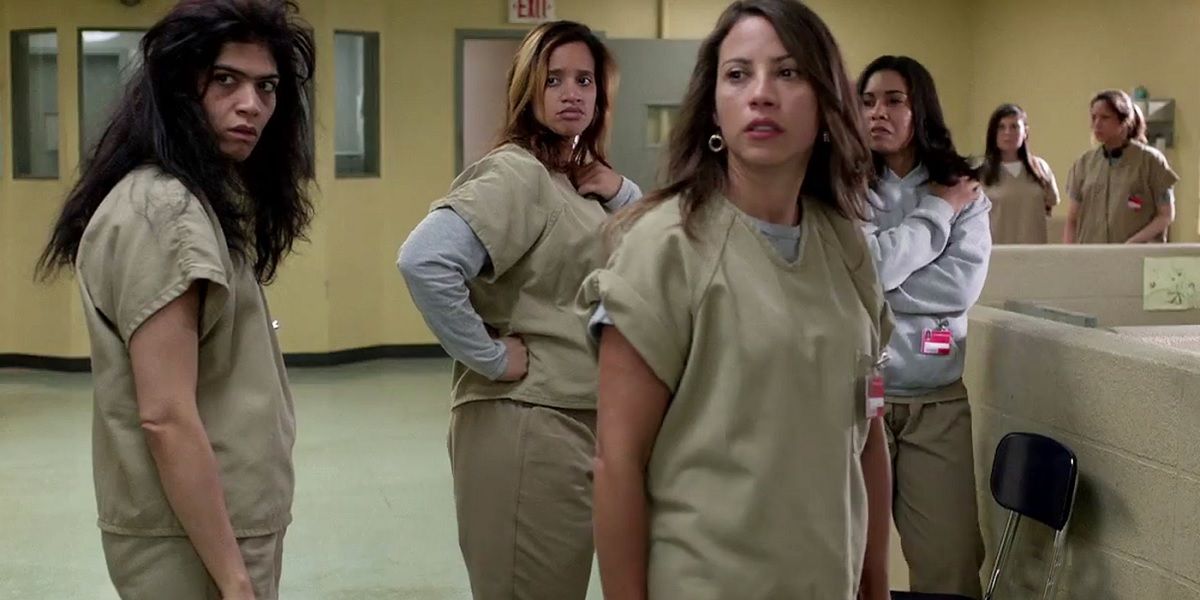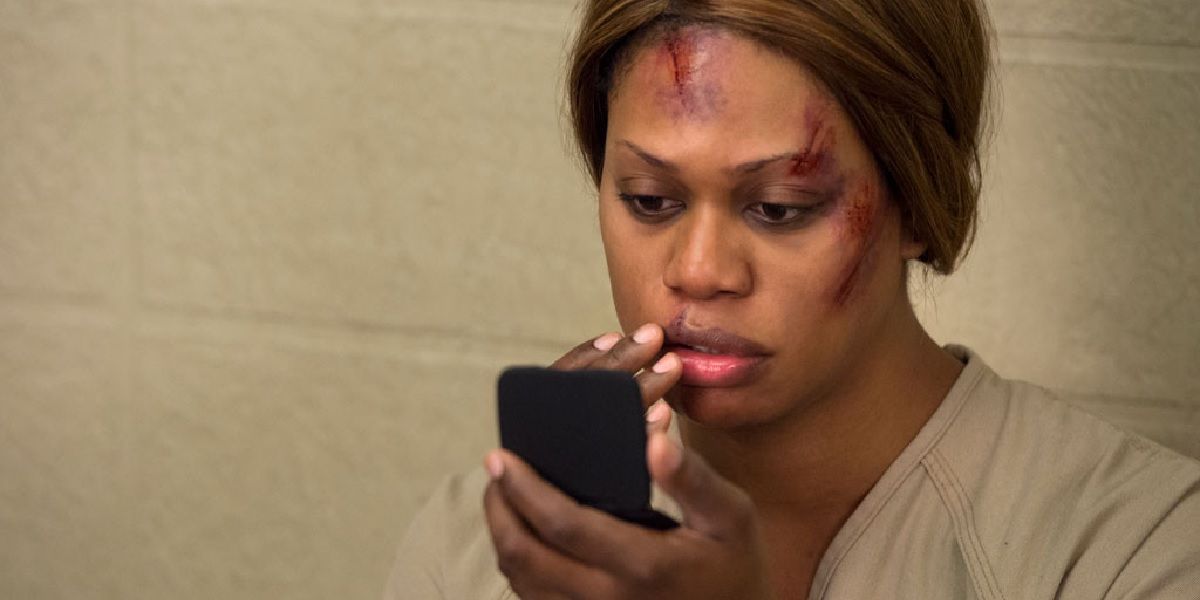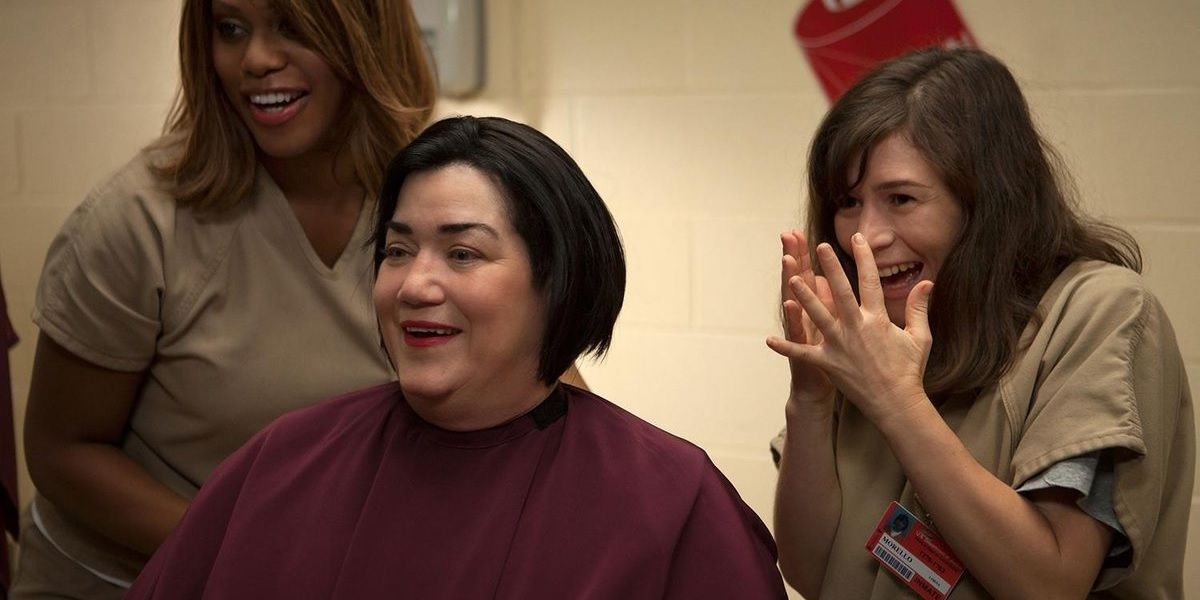Litchfield Prison is a strange place, and no more so than in Orange is the New Black season three. With a story arc that ambles along laconically and a lack of significant conflict such as the Piper vs. Pennsatucky clash from season one or the Vee vs. Red clash from season two, there are many times when Jenji Kohan's prison drama feels more like a low-grade boarding school drama. Yes, there are bed bugs and book burnings, but otherwise it's kind of easy to see why Taystee returned so quickly after her release in season one.
Here's a rundown of some of the things that the Litchfield inmates get to do in season three: join a drama club; go for a nice jog; get their hair done at the salon; eat an intimate home-cooked meal with prison hooch on the side; hang out with their kids at a petting zoo; run a dirty panty business; have hate sex in the library; lie back and catch some sun; do a spot of gardening; and follow the latest celebrity scandal on TV. It makes sense that Joe Caputo's reign is a little less strict than Natalie Figueroa's, especially with Mendez gone and a gaggle of inexperienced new guards being hired, but it doesn't really do enough to reinforce the inmates' description of Litchfield as a "hellhole." Then again, the lack of personal freedom is probably a bit of a downer.
The best way to describe Orange is the New Black season three is that there are many moments when it feels like Orange is the New Black fan fiction rather than the real thing. That's not to say it's not still entertaining, but it lacks the bite of the two previous seasons. Much of what happens could best be described as fluff, the number of concurrent subplots makes the structure feel very scattered (and not in a good way), and as a whole the season arc just doesn't have much forward momentum.
Orange is the New Black is at its best when it really hones in on a single character for an episode, as this season does with characters like Boo, Chang and Caputo. Even when that does happen, however, it doesn't quite live up to previous high points like Morello's disturbing backstory from season two or Red's introduction in "Tit Punch." Here's a rundown of some of the key plots from Orange is the New Black season three - including the good, the bad, and the very, very weird.
-
Piper's Panty Business, Alex's Assassin & the Stella Dilemma
Probably the most grating aspect of Piper's character in previous seasons was her obsession with appearing nice, if not always with being nice, so it's quite pleasing to see her get called out on this by Red early on in season three. Piper has always been a bit weird, bouncing back and forth across the net dividing "timid nice girl Piper" and "evil ice queen Piper," but in season three she decides to throw herself more or less wholeheartedly into the second personality by filling the power vacuum left behind by Vee and Red.
It's difficult not to be incredulous about the idea of Piper being at the top of Litchfield's food chain, and her business of making the inmates wear the sexy panties they're making for Litchfield's new corporate overlords and selling them to men with unique interests over the Internet is, while fairly engaging, not really as funny as the writers want it to be. Piper's rallying speech to her new 'employees' is one example of a scene that goes on for far too long and ends up falling flat.
Meanwhile, Alex is back and suffering from paranoia about being hunted down by assassins, which is a story arc that does have a pretty great ending, but the ongoing romantic tousles between her and Piper feel tired and poorly executed. Over the course of the season they go from having furious hate sex to settling down as a boring prison couple to breaking up over sexy Australian inmate Stella (played by newcomer Ruby Rose). From day one it's been difficult to get invested in Alex and Piper as a couple, and the pairing hasn't grown any more interesting over time.
It's hard to say much about Stella, since it's very apparent that the character was introduced as a lust object for Piper and not much else. She doesn't get a flashback, she doesn't get a lot of back story, and she looks far too perfect for a character who only has access to the kind of beauty products that the prison commissary has to offer. If it weren't for other characters taking note of her, it would be all too easy to believe that Stella is just a sexy figment of Piper's imagination.
-
Joe Caputo and the Big Sell Out
If Orange is the New Black season three can be said to have an A-plot, it's probably Joe Caputo's ongoing struggle to keep Litchfield running smoothly without violating his own moral code. That's easier said than done when the prison is threatened with closure, forcing Caputo to turn to prison corporation MCC (an analog for real-life company CCA) in order to maintain a steady job for himself and the guards.
Whereas the lives of the people running the prison have previously only been featured in brief interludes, they come into the light a lot more in this season. Caputo, Bennett and Healy all get flashbacks, and one of the key running themes is Caputo's lifelong attempts to be altruistic - helping out ungrateful people at the expense of his own success and happiness.
Caputo is a really great character and Nick Sandow gives an excellent performance this season, showing a man whose integrity has been pushed so far that it could snap at any moment. There are times when the depiction of corporate structure and its failings gets a little cartoonish and season three probably could have done with a stronger spine than this, but if nothing else it makes for a powerful and complex character study.
-
The Correctional Officers Strike Back
One of the many enjoyable things about Orange is the New Black is its portrayal of the correctional officers at Litchfield, who are just as diverse and interesting as the prisoners. Mendez filled the role of the power-drunk sadist in the first couple of seasons, but season three shines a new light and refreshing light on the remaining guards.
Fundamental to the story arc of Litchfield being taken over by a huge corporation and its staff finding their hours cut is the core sentiment that Ford, Bell, O'Neill, Donaldson and the rest of the crew aren't monsters or evil oppressors. They're just regular people with difficult and badly paid jobs that they're trying to carry out as best they can (with the notable exception of Luschek), while dealing with their own burdens like kids and mortgages and rumpus rooms.
The new part-time officers hired at the behest of MCC - a batch that includes a baby-faced 21 year-old, a donut-scoffing rapist, and an officer who runs away from an altercation between inmates instead of trying to intervene - give both the inmates and the audience new appreciation for the old guard. Let's hope that their walk-out in the season finale isn't the last we see of them.
-
Early Release for Bennett and Nichols
One of the surprises this season was the departure of both Bennett and Nichols by the end of the third episode. It's a bold move - particularly cutting a fan-favorite character like Nichols - but on both accounts the removal of the character is pretty well-implemented. Bennett has been dancing around the dilemma of his pregnant prison girlfriend for two seasons already, and his flashback episode "Bed Bugs and Beyond" finally takes the bull by the horns and tells the audience what kind of man he really is.
Although the highlight of Bennett's flashback is clearly Matt McGorry dancing and lip-syncing to a Gwen Stefani song, the clearest moment of resonance comes when Bennett gets put under pressure and is shown to be a coward - fleeing both from a literal grenade and a metaphorical one. His characterization also provides an interesting contrast to Aleida's boyfriend, Cesar, who does at one point threaten to shoot one of his young charges, but nonetheless clearly cares a great deal about Aleida's kids and doesn't shy away from the responsibility of raising them.
Nichols' departure is easily the toughest emotional moment of the season, providing a raw and painful look at the struggle of addiction. As is the case with Bennett, it takes a few episodes for the reality that Nichols really isn't coming back to sink in, and it's hard not to hope that we'll somehow see her again next season.
Next page: Crazy Eyes, Holy Norma, Daya's Baby and Sophia's Feud
-
Fifty Shades of Crazy
Easily one of the worst ideas in Orange is the New Black season three is turning Crazy Eyes into Litchfield's own E.L. James, complete with a horde of adoring and horny fans. There was room for this to potentially go in a more interesting direction, especially since the show has previously touched on the many other ways that the inmates try to stave off sexual frustration, but mostly it just gets used for comic relief.
The character of Suzanne Warren and Uzo Aduba's portrayal of her has been one of the key ingredients of the show so far, representing a beautiful blend of comedy and tragedy. Season three leans heavily on the former, and not much on the latter, and Crazy Eyes' story arc - more so than anyone else's - feels like fan fiction material; she says and does a lot of kooky things and at the end of it all she gets a happy ending.
The only real conflict for Suzanne this season is her denial about Vee's death, and probably one of her best scenes comes when she and Taystee take a break from the levity to share their collective grief. Her worst scene? Definitely the turtle moment.
-
Praise Be to Norma
Crazy Eyes' alien porn might be one of the weakest elements of this season, but it's not the weakest. That dubious honor goes to Norma's bizarre story arc, in which the rest of the prison inmates take her muteness as a sign of holiness, come to believe that she has magic powers and begin praising her as their new messiah.
The tone of this subplot bounces weirdly between the serious and the comedic, and overall it just takes up far too much space. Norma's actual flashback episode "Tongue-Tied" is pretty interesting, showing that her subservience to Red was preceded by her lengthy marriage to a polyamorous hippie preacher. The idea of Norma finally breaking out of old habits and becoming a hero to be worshipped in her own right is interesting in theory, but poorly executed in practice.
To make matters worse, a lot of the other characters' story arcs - including Leanne, Poussey, and Brook - are tied up in Norma's new religion. Out of all of Norma's followers, Brook's character arc is probably the most engaging as she stumbles around from one clique to the next, trying to find people who won't constantly tell her to shut up. The way she eventually settles with Taystee's group has a slightly after-school special vibe of overcoming racial boundaries to it, but for the most part it still works.
-
The Diaz Family Values
With Bennett out of the picture early on, Dayanara is left to deal with the decision of whether to give up her baby for adoption to Mendez's wealthy, compassionate mother (played by Mary Steenburgen) or to keep the baby and accept the fact that it will be raised by Cesar for the first three years of its life.
Aleida is definitely one of the most interesting characters on Orange is the New Black. She's hard-hearted, vindictive, greedy and almost entirely lacking in maternal instinct, but a flashback in which she sends a young Dayanara off to summer camp and discovers a kind of tenderness in jealousy is one of the more touching and sad moments of the season.
Steenburgen also contributes a sensitive performance as Delia, the Dr. Frankenstein to Mendez's monster, who badly wants a new child to care for and feels that raising her supposed grandchild will make up for his crime. Pablo Schreiber makes a very brief return as a disturbingly de-mustachioed Mendez, who is behind bars and still madly in love with Daya and the child whom he thinks is his. This is easily one of the better arcs of the season.
-
Mothers at Arms
Two inmates who seemed very unlikely to ever find themselves at loggerheads were Sophia Burset and Gloria Mendoza. After being handed a prime position as the head of the kitchen, Gloria showed little interest in playing Vee and Red's petty prison gang games, and in season three she voluntarily hands her job back to Red. Sophia, meanwhile, has so far seemed to be one of the few people that everyone gets along with - though that might just be because she's the only decent hairdresser at Litchfield.
If there's one thing that's bound to turn two parents against each other, however, it's a disagreement over their children. Sophia's son turns foul-mouthed after spending a car ride with Gloria's eldest, which in turn leads to the two women coming to verbal blows over the matter of whether Benito is a bad influence, which eventually leads to Sophia being shunned by the rest of the prison and viciously beaten up by a group of inmates who have been listening to rumors spread by Aleida.
Sophia's story arcs in past seasons have skilfully touched on the challenges of being transgendered in more subtle ways - such as Michael turning her in to the police, casually transphobic remarks from her fellow inmates, and her strained relationship with her wife - so it's a shame that a significant event like this is largely just turned into a new angle for Caputo's storyline. Portraying some of the more brutal realities of living as a transwoman was a good idea in theory, but it could have been handled a lot better. Let's hope that the fallout is dealt with a little better in season four.
-
Conclusion
To Orange is the New Black's credit, virtually every character in its massive cast has their own story arc this season and it would be impossible to go into detail about all of them. Other highlights include the ongoing friendship between Big Boo and Pennsatucky, whose subplot culminates in the two of them debating the morals of sticking a broom handle up the rapist guard's butt as a form of revenge. Chang gets to star in her own Chang-focused episode, which is a lot of fun even if it does ruin the mystery of Chang. Meanwhile, Cindy becomes Jewish as part of a scam to get tasty kosher meals, and ends up accidentally becoming Jewish at heart.
The main problem with Orange is the New Black season three is that it's just too jumbled. There are too many little subplots going on, and only around half of them are actually compelling. There's too little conflict to ever keep the audience on edge, and as a whole the season lacks momentum and cohesiveness.
That's not to say that it isn't still watchable. Netflix viewers can still easily blast through this whole season in just a few days, but if this show aired week-by-week on TV instead of in one big chunk online, it's easy to imagine ratings dropping pretty fast this season. The comparison to the two previous seasons is like the difference between scoffing a box of expensive chocolates and eating a stolid bar of store-brand chocolate; it's still sweet and sort of tasty, but it's just not as good.
Orange is the New Black season three is available on Netflix.

